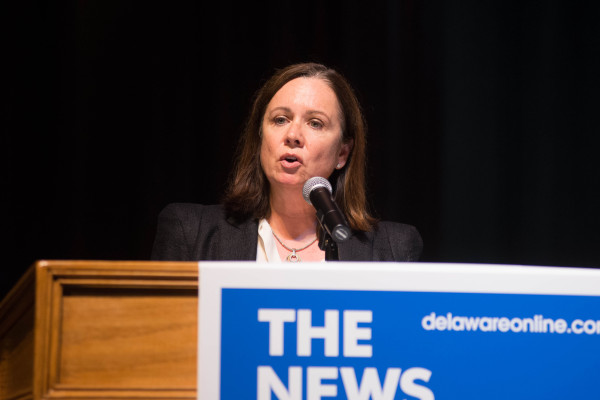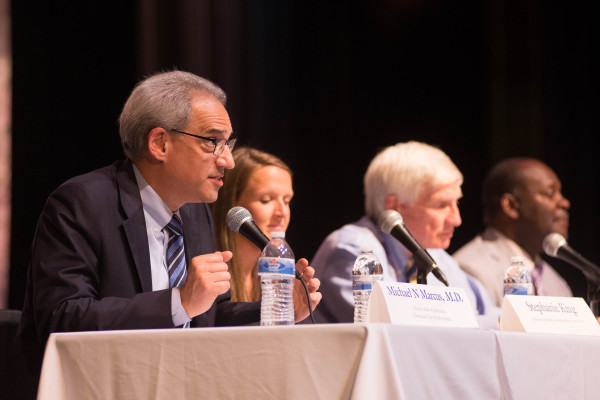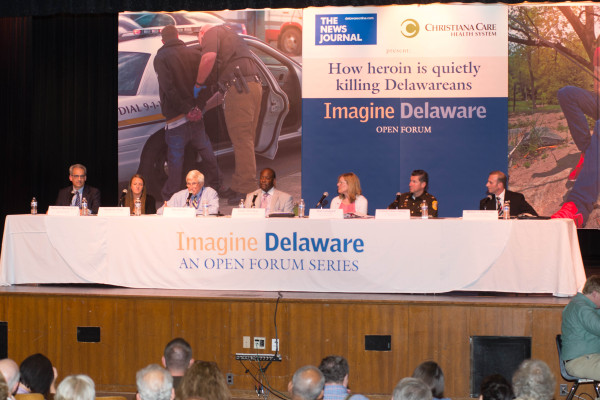Imagine Delaware forum highlights community need to tackle heroin addiction

Inside a John Dickinson High school’s jam-packed auditorium, Christiana Care leaders highlighted the value of community partnerships in solving the heroin crisis in Delaware, which The News Journal chronicled this week.
“At Christiana Care, we exist to improve the health and quality of life of our neighbors in our community, whom we are privileged to serve, and we do that in partnership with our community,” said Janice Nevin, M.D., chief medical officer at Christiana Care, who was introduced by Susan D. Leath, president and publisher of The News Journal. “Each month, 12 to 14 heroin deaths occur in Delaware. We must solve it together as a community.”

Sponsored by Christiana Care, the Imagine Delaware forum on Tuesday in Pike Creek gave the public an opportunity to build new relationships and learn about helpful services available to treat people addicted to heroin. The forum featured Michael Marcus, M.D., Christiana Care’s interim chair of psychiatry, who spoke about Project Engage, an innovative program created in 2008 by Terry Horton, M.D., Christiana Care’s chief of addictive medicine.
Project Engage collaborates with Brandywine Counseling & Addiction Services to save lives. The program — highlighted as a solution to addiction in The News Journal’s series — uses employees known as engagement specialists who meet with patients and families at a teachable moment, often during a period of withdrawal from drugs. The engagement specialists offer support and share their own struggles with addiction and how they were able to overcome it.

“That empathy and that support from an engagement specialist is often the pivotal action that can motivate a patient to finally believe they can break free of their addiction, even if they have struggled with it for years or decades,” Dr. Marcus said.
News Journal Executive Editor David Ledford referred to Project Engage as a “very successful program because it recognizes what patients need.” Thirty percent of patients who meet with engagement specialists enter a drug treatment program, compared to a success rate of less than 10 percent for most hospital programs.
“Project Engage reflects our commitment to patient- and family-centered care,” Dr. Marcus said. “We want to engage people when they are at rock bottom. We meet them where they are and sow the seeds of recovery.”

During the symposium, Dr. Marcus advocated for the state to pass legislation that would allow Naloxone, an overdose-reversal medication, to be available with a prescription. Naloxone takes seconds to administer and can be used to reverse the effects of a heroin overdose.
Dr. Marcus also emphasized that families need to recognize their own vulnerabilities to addiction.
“Knowing your family’s vulnerabilities to addictions is similar and just as important as knowing your own medical history,” he said. “When families are able to recognize their vulnerabilities, they are more likely to avoid drug use.”
Christiana Care employees also were on hand to connect families to resources at the Herman Rosenblum, M.D., Child & Adolescent Center and the Center for Comprehensive Behavioral Health.
Other panelists at the forum included: Delaware Health and Social Services Secretary Rita Landgraf; Stephanie King, a 24-year-old recovering heroin addict from Pike Creek; James Harrison, operations director at Brandywine Counseling and a recovering heroin addict; New Castle County Police Chief Elmer Setting; Don Keister, co-founder of atTAck Addiction; Michael DellaCorte, special agent in charge of the Drug Enforcement Agency for Delaware and Pennsylvania.